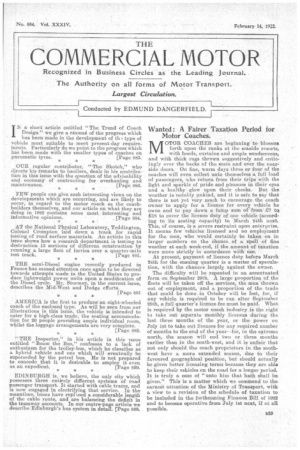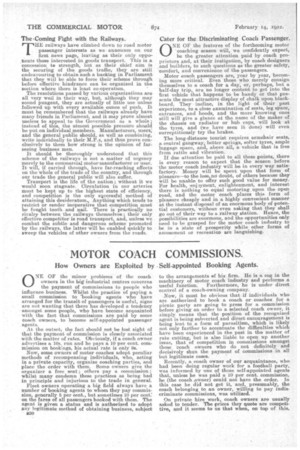Wanted: A Fairer Taxation Period for Motor Coaches.
Page 1

Page 2

If you've noticed an error in this article please click here to report it so we can fix it.
OTOR COACHES are beginning to blossom forth upon the ranks at the seaside resorts, with hoods, curtains and ample wandscre,ens, and with thick rugs thrown suggestively and enticingly over the backs of the seats and over the nearside doors.. On fine, warm days three or four of the coaches will .even collect unto themselves a full load Of passengers, .uho return from their triPS'with the light and sparkle of pride and pleasure in their eyes and a healthy glow upon their cheeks. But the weather is notably unkind, and it is safe to say that there is not yet very much to encourage the coach owner to apply for a licence for every vehicle he Owns and to pay down a lump sum of from £7 to £18 to cover the licence duty of one vehicle (according to its seating capacity) to March 24th next. This, of course, is a severe restraint upon enterprise. It means, few vehicles licensed and no employment for the men who would certainly be taken on in larger numbers on the chance of a. spell of fine weather at each week-end, if the amount of taxation were more strictly in accordance with use.
At present, payment of licence duty before March 24th for the ensuing quarter is a matter of speculation, with the chances largely against the owner.
The difficulty will be repeated in an accentuated form on September 29th. A large proportion of the fleets will be taken off the services, the men thrown out of employment, and a proportion of the trade that could be done in October will be lost, for if any vehicle is required to be run after September 25th, a full quarter's licence fee must be paid. What is required by the motor coach industry is the right to take out separate monthly licences during the last three months of the year, or the power on July 1st to take out licences for any required number of months to the end of the year-for, in the extreme north, the season will end two or three months earlier than in the south-west, and it is unfair that not only should the coach proprietors in the southwest have a more extended season, due to their favoured geographical position, but should actually be given better licensing terms because they are able to keep their vehicles on the road for a longer period. It is truly a ease of "unto him that hath shall be given." This is a matter which we commend to the earnest attention of the Ministry of Transport, with a view to a revision of the schedule of taxation to be included in the forthcoming Finance Bill of 1922 and to become operative from July 1st next, if at all possible. THE COMMARCIAL MOTOR The,Coming Fight with the Railways. THE railways have climbed down to road motor passenger interests as we announce on our first news page, leaving as their only opponents those interested in goods transport. This is a concession to strength, but as their chief aim, is the securing of the goods traffic, they are still endeavouring to obtain such a backing in Parliament that they Will be able to force their scheme through before effective hindrance can be organized in the
section where there is least co-operation, . _
The resolutions passed by various organizations are all very wed in 'their way, but, although they may sound pungent, they are actually of little use unless followed up with every available ounce of push. It must be remembered that the railways already have many friends in Parliament, and it may prove almost useless to appeal to the Government as a whole ; instead of this, the utmost possible pressure should be put on individual ,members. Manufacturers, users; and the general public should, as well as combining, write individually to their M.P.s, and thus prove conclusively to them how strong is the opinion of farseeing business men.
It should be thoroughly understood that this scheme of the railways is not a matter of urgency merely to the commercial motormanufacturer or user. It will, if carried through, have far-reaching effects on the whole of the trade of the country, and through our trade the general public will also suffer.
Transport is the life of the nation; without it we would soon stagnate. Circulation in our arteries must be kept up to the highest state of efficiency, and competition is the only successful method of attaining this desideratum-. Anything which tends to restrict or render inoperative that competition must be fought tooth and nail. There is practically no rivalry between the railways themselves ; their only effective competitor is road transport, and, unless we combat the subtle and dangerous scheme promoted by the railways, the latter will be enabled quickly to sweep the vehicles of other owners from the roads.
Cater for the Discriminating Coach Passenger.
0 NE OF the features of the forthcoming motor coaching season will, we confidently expect, be the greater attention paid by coach proprietors and, at their instigation, by coach designers and builders, to such questions as the greater safety, 'comfort, and convenience of the passengers.
.Motor coaeh passengers are, year by year, becoming more critical. Even those who merely consign themselves to a coach for a day, or, perhaps, but a half-day trip, are no longer content to get into the first vehicle that happens to be handy or that presents the most attractive display of chalk upon blackboard. They incline, in the light of their past experience, to a close examination of seats, leg space, entrances, and hoods, and the more knowing ones still will give a glance at the name of the maker of the chassis on radiator or hub caps, will look at the tyres, and (we have seen it done) will even surreptitiously try the brakes.
The long-distance tourist requires armchair seats, a central gangway, better springs, softer tyres, ample luggage space, and, above all, a vehicle that is free from rattle and vibration.
If due attention be paid to all these points, there is every, reason to expect that the season before the motor coach industry will he in every way satisfactory. Money, will be spent upon that form of pleasure—to the lose, no doubt, of others because they will be unable to offer such good value for money. For health, .enj3yment, _enlightenment, and interest there is nothing to equal motoring upon the open road, and the motor coach places this form of pleasure cheaply and in a highly convenient manner at the instant 'disposal of an enormous body of potential customers,without even asking that they shall go out of their way to a railway station. Hence, the possibilities are enormous, and the opportunities only need to' be grasped for the motor coach industry to be in a 'state of prosperity while other forms of amusement or recreation are languishing.
































